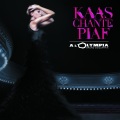
Kaas chante Piaf à l'Olympia (Live)
This is the recording studio version of the concert Patricia Kaas gave at Carnegie Hall in tribute to the 50th anniversary of Edith Piaf's passing. She is backed by the Royal Philharmonic Orchestra, a small studio band — accordion, bass, guitar, Theremin, keyboards — and even a chorus under the direction of Abel Korzeniowski, who also arranged the material and produced the album. The live performance, while a commercial success, had its share of critics, including Piaf purists, who were quick to note that Kaas doesn't possess the vocal range of her subject. Kaas fans found the size and power of the orchestra too daunting for her to overcome. Both of these arguments are likely to follow this studio production, but ultimately, both are in error. The cinematic quality provided by the orchestra and her band adds a haunting drama to these proceedings that points toward Kaas' smoky, sometimes even raspy, lower register. She doesn't attempt to imitate Piaf, but to pay homage to her enduring legacy and celebrate her influence. Kaas never betrays herself as a modern vocalist in the process. Instead, by interpreting these songs in her own way, she makes plain that Piaf's music is not only a root source of inspiration, but a breathing, evolving, entity that defies the limits of time and offers instruction for French chanson as it continues to evolve. Check the shifting moods and textures in "Mon Manege a Moi," the slow, smoldering sensuality and tragedy at the heart of her reading of "Mon Dieu," and the raw need expressed in "La Belle Histoire D'Amour," introduced and punctuated heavy brass, and alternately colored by a slow, strolling electric bass, piano, bells, and even a bass drum. The nod to Astor Piazzolla's nuevo tango in the accordion's introduction to "Non, Je Ne Regrette Rien" is a nice touch (Piaf loved tango, as does Kaas) is offset by pastoral strings in the backdrop, vamping on a series of three chords before the singer enters with the orchestra. The song unfolds as a reverie before becoming an anthemic celebration of life and love no matter its ultimate cost. It's unlikely that Kaas Chante Piaf will please "pure" fans of either woman; but then, it's not supposed to. In offering such a unique, sensitive, perhaps even iconoclastic interpretation of Piaf, Kaas underscores her own reputation as one of the great musical artists of our era.
专辑歌曲列表
-
Patricia Kaas 4527203 04:42
-
Patricia Kaas 2908054 03:01
-
Patricia Kaas 4920081 05:07
-
Patricia Kaas 2635114 02:44
-
Patricia Kaas 3020471 03:08
-
Patricia Kaas 5102745 05:18
-
Patricia Kaas 3941661 04:06
-
Patricia Kaas 4171276 04:20
-
Patricia Kaas 3244519 03:22
-
Patricia Kaas 3580238 03:43
-
Patricia Kaas 3022136 03:08
-
Patricia Kaas 4085693 04:15
-
Patricia Kaas 4490011 04:40
-
Patricia Kaas 2457896 02:33
-
Patricia Kaas 4286911 04:27

